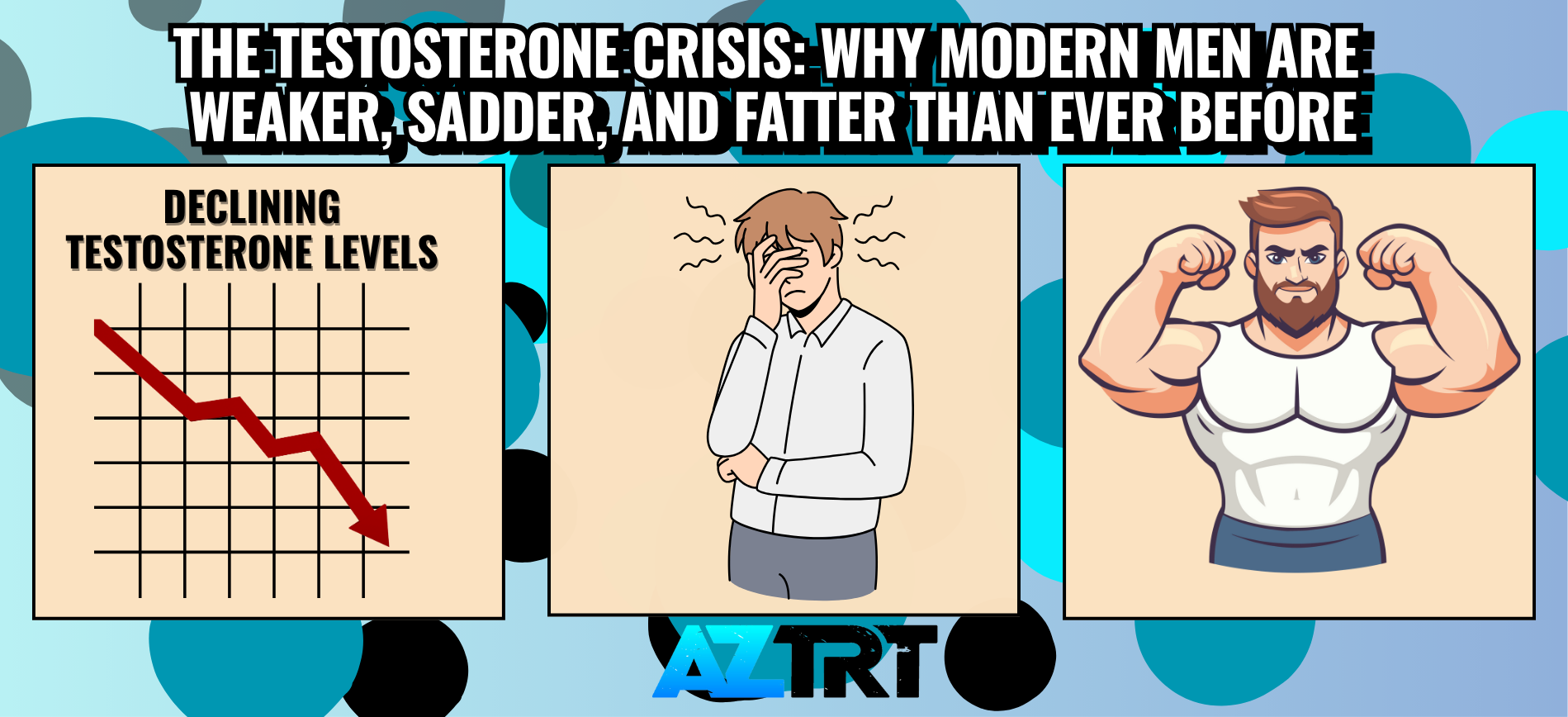
THE TESTOSTERONE CRISIS: WHY MODERN MEN ARE WEAKER, SADDER, AND FATTER THAN EVER BEFORE
And the surprisingly simple solution almost no one is talking about.
If you’re a man in your 30s, 40s, or 50s, chances are you’ve felt it: mornings that start with exhaustion, days spent in a fog, nights filled with frustration, and a nagging sense that you’ve lost your edge. You’re not alone — and you’re not just “getting older.”
Over the past 50 years, men’s average testosterone levels have dropped by more than 20%, according to a landmark study published in the Journal of Clinical Endocrinology & Metabolism (Travison et al., 2007). Worse yet, men today have 30% lower testosterone than their grandfathers did at the same age.
These staggering declines aren’t just statistics — they’re at the heart of why millions of modern men are weaker, sadder, and fatter than ever before.
📉 Why Testosterone Matters: Beyond Muscles and Libido
Testosterone isn’t just a “sex hormone.” It’s a vital regulator of nearly every system in your body. It influences your energy, mood, metabolism, and even your brain’s ability to think clearly and stay motivated.
Multiple studies, including research published in Biological Psychiatry (Zarrouf et al., 2009), show that low testosterone is strongly associated with depression, irritability, and lack of motivation. This isn’t just psychological — testosterone acts directly on the prefrontal cortex and limbic system, regions of the brain responsible for decision-making, emotional regulation, and drive.
When levels decline:
- The brain produces less dopamine, the neurotransmitter linked to motivation and reward.
- Cortisol, the stress hormone, rises unchecked — leading to fatigue and anxiety.
- Neural connections that support confidence and assertiveness weaken.
The result? A downward spiral of low energy, poor mood, and diminishing ambition — making it even harder to break the cycle.
🧪 Why Are Modern Men Losing Testosterone?
It’s not a coincidence. Our modern lifestyle is engineered to sap male hormones:
- Environmental toxins like phthalates and BPA (found in plastics) disrupt endocrine function and have been linked to declining sperm and testosterone levels (Swan et al., Human Reproduction Update, 2017).
- Chronic stress elevates cortisol, which suppresses testosterone production at the source.
- Poor sleep — studies show that sleeping less than 5 hours per night for even one week can reduce testosterone by 10-15% (JAMA, Leproult & Van Cauter, 2011).
- Processed diets spike insulin, cause inflammation, and drive belly fat, which converts testosterone into estrogen via aromatase enzymes.
⚠️ The Hidden Costs of Low Testosterone
Low testosterone isn’t just about sex drive or gym performance. Left untreated, it can cause:
- Rapid fat gain, especially in the belly
- Weakness and muscle loss, even if you exercise
- Chronic fatigue that no amount of coffee can fix
- Brain fog and forgetfulness
- Erectile dysfunction and lack of sexual desire
- Irritability and depression, making relationships harder
Most men try to tough it out, blame themselves, or get misdiagnosed with depression or anxiety — and prescribed medications that mask symptoms rather than fix the problem.
✅ The Surprisingly Simple Solution
Optimizing your testosterone levels doesn’t require guesswork or endless doctor visits. At AZTRT, we provide a science-based, doctor-supervised program designed to restore your hormones safely and effectively — from the comfort of your home.
Here’s how it works:
- Comprehensive Blood Testing — We send a lab order to your home or local lab to precisely measure your hormones.
- Expert Consultation — Our licensed providers review your labs and symptoms to determine if testosterone therapy is medically appropriate.
- Personalized Treatment Plan — If eligible, you’ll receive prescription-grade testosterone delivered discreetly to your door.
- Ongoing Support — We retest and adjust your dosage to keep you in the optimal range, so you never feel off.
Everything is designed to be easy, affordable, and tailored to you, so you get back to feeling energized, motivated, and alive.
📚 References
- Travison TG et al. Declining testosterone levels in men. J Clin Endocrinol Metab. 2007;92(1):196–202.
- Zarrouf FA et al. Testosterone and depression: systematic review. Biol Psychiatry. 2009;65(7):554–560.
- Swan SH et al. Environmental phthalates and human reproductive outcomes. Hum Reprod Update. 2017;23(6):711–733.
- Leproult R, Van Cauter E. Effect of sleep loss on testosterone. JAMA. 2011;305(21):2173–2174.
🔥 Reclaim Your Edge Today
Every day you wait, your levels continue to decline, and the symptoms worsen. But you don’t have to accept this. Thousands of men just like you have reclaimed their energy, drive, and confidence — and you can, too.
👉 Click here to schedule your confidential consultation now.



